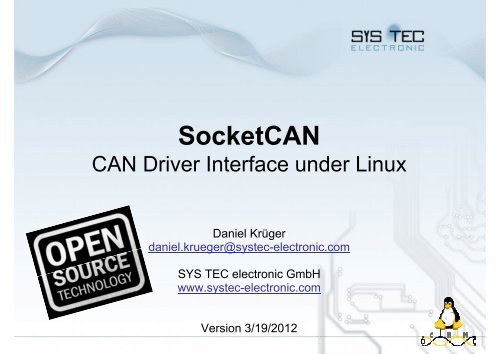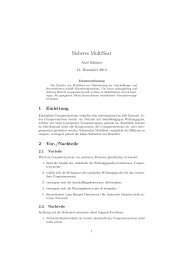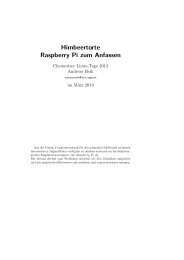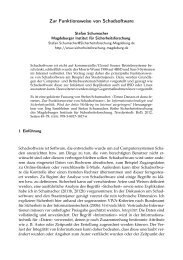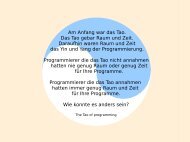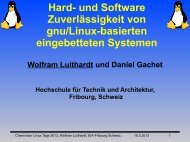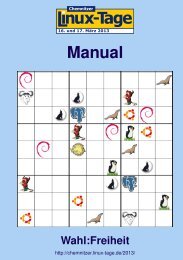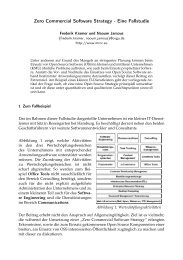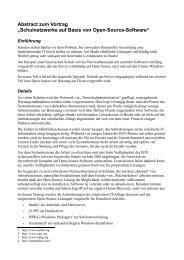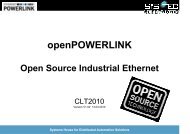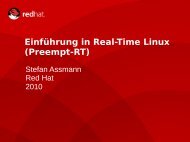SocketCAN - Chemnitzer Linux-Tage
SocketCAN - Chemnitzer Linux-Tage
SocketCAN - Chemnitzer Linux-Tage
You also want an ePaper? Increase the reach of your titles
YUMPU automatically turns print PDFs into web optimized ePapers that Google loves.
<strong>SocketCAN</strong><br />
CAN Driver Interface under <strong>Linux</strong><br />
Daniel Krüger<br />
daniel.krueger@systec-electronic.com<br />
SYS TEC electronic GmbH<br />
www.systec-electronic.com<br />
Version 3/19/2012
What is CAN?<br />
● CAN = Controller Area Network<br />
● Developed by Bosch (starting in 1983)<br />
● Multi master network<br />
● Short broadcast messages (up to 8 Byte)<br />
● Bit rate: up to 1 MBit/s<br />
● Network length up to 5 km<br />
(depending on the used bit rate)<br />
● Powerful error detection mechanism<br />
minimum error rate of 4,7*10 -11
CAN Standard Frame Format<br />
● Dominant bit: logical 0<br />
● Recessive bit: logical 1<br />
● Lowest message identifier wins bus arbitration<br />
● Message identifier: no unique node-ID
<strong>SocketCAN</strong><br />
● <strong>SocketCAN</strong> is the framework for CAN under <strong>Linux</strong><br />
● Replaces plenty of vendor-specific CAN APIs<br />
● CAN drivers are network drivers<br />
● Applications receive and transmit CAN messages<br />
via BSD Socket API<br />
● Configuration of CAN interfaces:<br />
via netlink protocol<br />
● Mainline since <strong>Linux</strong> 2.6.25
<strong>SocketCAN</strong><br />
● linux/can.h<br />
struct can_frame {<br />
u32 can_id; /* 29 bit CAN_ID + flags */<br />
u8 can_dlc; /* data length code: 0 .. 8 */<br />
u8 data[8];<br />
};<br />
#define CAN_EFF_FLAG 0x80000000U<br />
/* extended frame format */<br />
#define CAN_RTR_FLAG 0x40000000U<br />
/* remote transmission request */<br />
#define CAN_ERR_FLAG 0x20000000U /* error frame */<br />
● linux/can/...
Setup CAN channel<br />
● Configure bit rate:<br />
$ ip link set can0 type can bitrate 125000<br />
● Set interface up and running:<br />
$ ifconfig can0 up<br />
● Common pitfall:<br />
Standard distro kernels do not enable<br />
CONFIG_CAN_CALC_BITTIMING<br />
● Bitrate setting<br />
$ ip link set can0 type can bitrate 125000
<strong>SocketCAN</strong> initialization<br />
int iSock;<br />
struct sockaddr_can addr;<br />
iSock = socket(PF_CAN, SOCK_RAW, CAN_RAW);<br />
addr.can_family = AF_CAN;<br />
addr.can_ifindex = if_nametoindex("can0");<br />
bind(iSock, (struct sockaddr *)&addr,<br />
sizeof(addr);
Send CAN message<br />
struct can_frame frame;<br />
frame.can_id = 0x123;<br />
frame.can_dlc = 1;<br />
frame.data[0] = 0xAB;<br />
nbytes = write(iSock, &frame,<br />
sizeof(frame));
Receive CAN message<br />
struct can_frame frame;<br />
nbytes = read(iSock, &frame, sizeof(frame));<br />
if (nbytes > 0) {<br />
}<br />
printf(“ID=0x%X DLC=%d data[0]=0x%X\n”,<br />
frame.can_id,<br />
frame.can_dlc,<br />
frame.data[0]);
CAN error handling<br />
● frame.can_id & CAN_ERR_FLAG<br />
frame.can_id & CAN_ERR_BUSOFF<br />
frame.can_id & CAN_ERR_ACK<br />
frame.can_id & CAN_ERR_RESTARTED<br />
frame.can_id & CAN_ERR_CRTL<br />
frame.data[1] & (CAN_ERR_CRTL_RX_WARNING |<br />
CAN_ERR_CRTL_TX_WARNING)<br />
frame.data[1] & (CAN_ERR_CRTL_RX_PASSIVE |<br />
CAN_ERR_CRTL_TX_PASSIVE)<br />
frame.data[1] & (CAN_ERR_CRTL_RX_OVERFLOW |<br />
CAN_ERR_CRTL_TX_OVERFLOW)<br />
frame.can_id & CAN_ERR_PROT
CAN bus-off<br />
● CAN controller enters bus-off state,<br />
when internal error counters reach a limit,<br />
e.g. in case of short-circuit between CAN_H, CAN_L<br />
● Live demo,<br />
$ ip -det -stat link show can0<br />
● Recover from bus-off:<br />
$ ip link set can0 type can restart
Diagnostics<br />
$ ip -det -stat link show can0<br />
9: can0: mtu 16 qdisc pfifo_fast state<br />
UNKNOWN qlen 10<br />
link/can 00:02:48:a2:03:00 brd 00:00:00:00:00:00<br />
can state ERROR-ACTIVE restart-ms 0<br />
bitrate 1000000 sample-point 0.750<br />
tq 62 prop-seg 5 phase-seg1 6 phase-seg2 4 sjw 1<br />
systec_can: tseg1 1..16 tseg2 1..8 sjw 1..4 brp 1..255 brp-inc 1<br />
clock 48000000<br />
re-started bus-errors arbit-lost error-warn error-pass bus-off<br />
0 0 0 0 0 0<br />
RX: bytes packets errors dropped overrun mcast<br />
0 0 0 0 0 0<br />
TX: bytes packets errors dropped carrier collsns<br />
0 0 0 0 0 0
CAN utilities<br />
● Source: https://gitorious.org/linux-can/can-utils<br />
$ git clone git://gitorious.org/linuxcan/can-utils.git<br />
$ ./candump can0<br />
can0 4A2 [4] 27 96 C1 6C<br />
can0 151 [8] ED 85 FA 65 0D EB C2 4A<br />
can0 123 [2] AB CD<br />
$ ./cangen can0<br />
$ ./cansend can0 123#abcd
Untouched subjects<br />
● Higher layer protocols: CANopen, J1939, DeviceNet<br />
● Extended frame format (29 bit CAN identifier)<br />
● CAN message filtering<br />
● Bit rate calculation<br />
● Error handling: CAN error frames, bus-off recovery<br />
● CAN driver structure
Conclusion<br />
● <strong>SocketCAN</strong><br />
Uniform and well-defined CAN framework for <strong>Linux</strong><br />
● CAN<br />
Flexible<br />
Powerful<br />
Cost-effective<br />
● Future: CAN with Flexible Data-Rate (CAN FD)<br />
Higher bit rates<br />
Longer data fields (more than 8 Byte)<br />
Bus arbitration is identical to classic CAN<br />
First CAN FD controllers expected at end of 2012
References<br />
● Specification: CAN 2.0 (by Bosch in 1991)<br />
● Standards: ISO 11898-1:2003, ISO 11898-2:2003<br />
● <strong>SocketCAN</strong>: https://gitorious.org/linux-can/<br />
● CAN FD: http://www.boschsemiconductors.de/media/pdf/canliteratur/can_fd.pdf
Thank you for your attention


